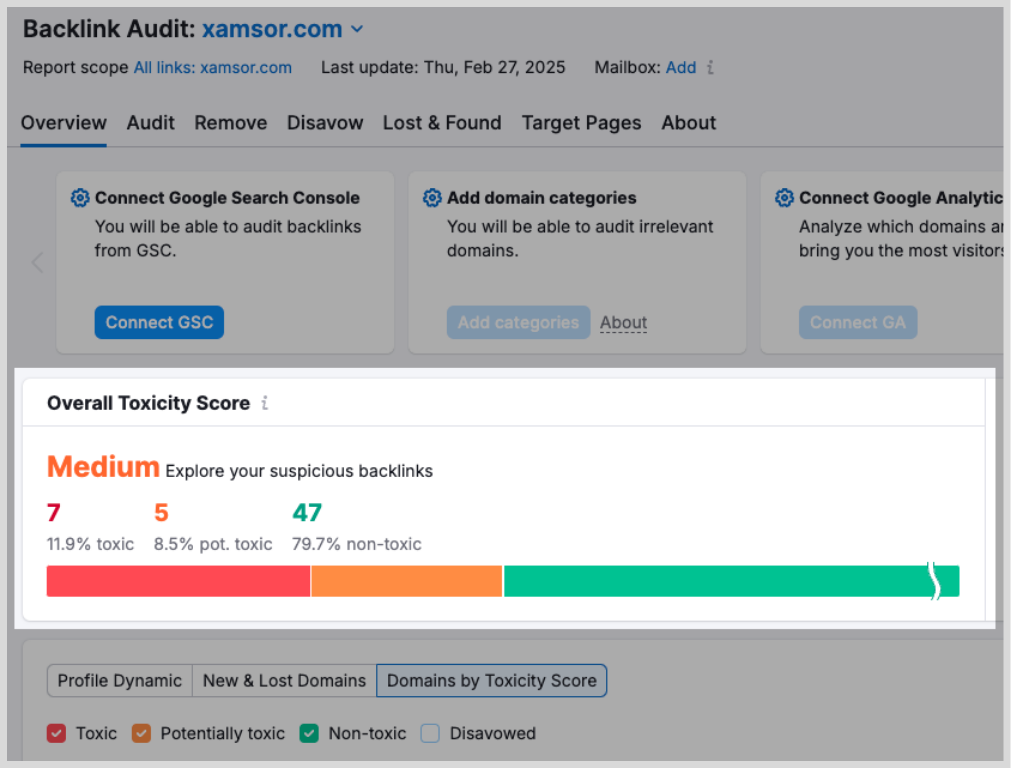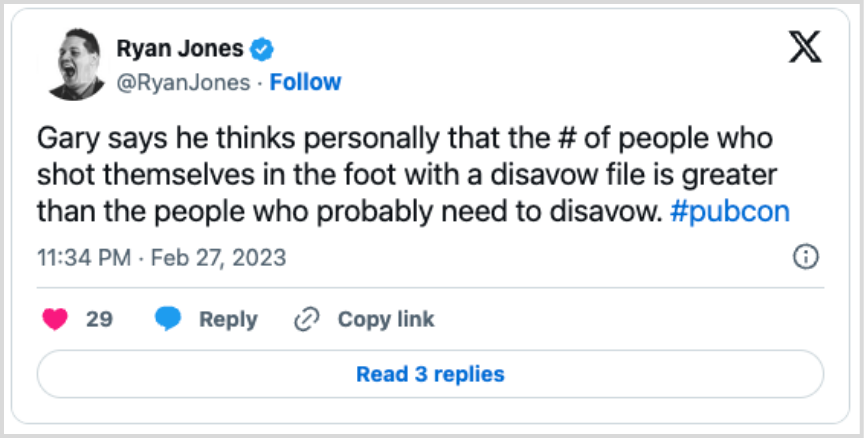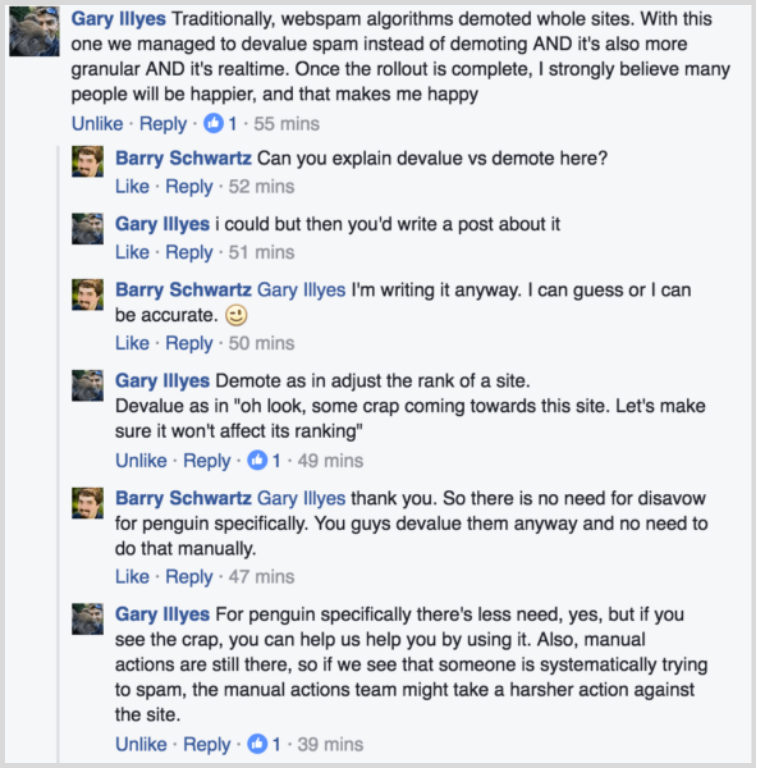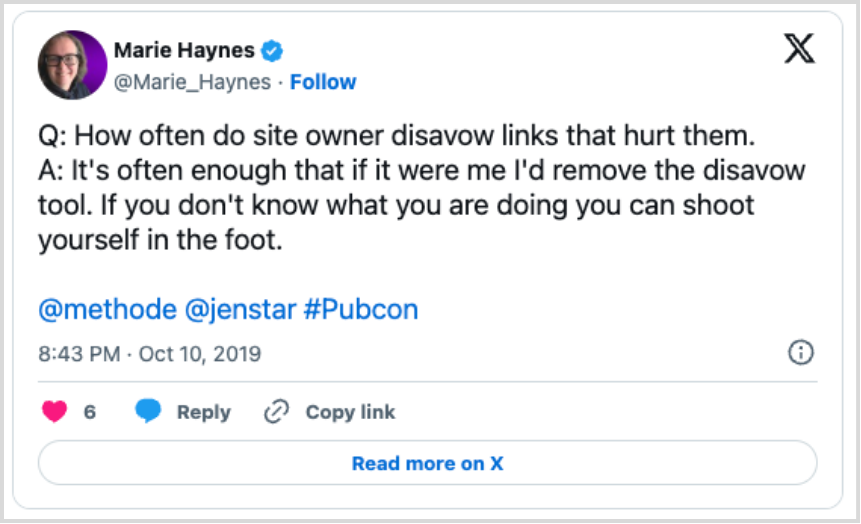Contents
Should You Disavow Toxic Links? What Google and SEOs Say
Google used to penalize sites for toxic links and unnatural link building before.
Here’s how the manual penalty action looked on the site’s Search Console:

The site owner had to disavow these “toxic” links to remove the manual penalty.
However, over the years, Google has changed its stance on toxic links, disavowing, and manual penalties.
Before we dive into that, let’s first understand what a “toxic” link is.
Contents
What’s a Toxic Link?
A toxic link is a backlink from spammy websites.
Or, as Google defines them, toxic links are unnatural, artificial, deceptive, or manipulative links that point to a site’s pages.
SEO tools like Semrush even provide you with a site toxicity score.

Now, where do these toxic links come from?
Toxic links are backlinks from spammy websites like:
- Private Blog Networks (PBNs): Links from a private network of sites designed to manipulate site rankings.
- Spammy Directories: Backlinks from low-quality, automated directories.
- Comment Spam: Links posted in blog comment sections of irrelevant forums, or even adult sites.
- Hacked Links: Links from sites that have been compromised by malware.
- Irrelevant or Foreign Language Sites: Backlinks from websites with no relevance to your content.
Toxic links arise because of two main reasons:
First, link-building has gone wrong. Second, a negative SEO from competitors.
Either way, the big question is:
Should one worry about toxic backlinks? Should one disavow these toxic links?
Here’s what Google and SEOs say.
#1. Google’s Stance on Toxic Backlinks
Over the years, Google has changed its stance on disavowing toxic links.
Google now identifies and ignores most of the toxic links.
In addition, Google now says to disavow links if and only if the site is penalized by Google’s manual action.
Google: Disavow Only in Case of Manual Penalty
Google’s support documentation clearly states that most site owners do NOT need to use the disavow tool.
Here’s what the Google Search Console help says:

In fact, Google goes one step ahead and cautions site owners not to disavow links unless hit with a manual penalty.

Disavowing links without any manual penalty from Google can potentially harm the site’s performance in search results.
John Mueller: You Don’t Need to Disavow
Google spokespersons say the same thing as well.
If you’re seeing individual links that pop up and you say, “oh this looks like a spammer dropped the link” or whatever, I would completely ignore those. […] because these spammy links happen to every website and Google’s system has seen them so many times over the years that we’re very good at just ignoring them.
—John Mueller, Search Advocate Google
When asked by a user whether one should not disavow even with super bad links pointing to their site, Mueller repeated the same answer:
Ignore them. You don’t need to disavow those links.
—John Mueller, Search Advocate Google
Gary Illyes: Disavowing Hurts More Than It Helps
Gary Illyes, a Google Search analyst, said the same thing in a 2023 PubCon Q&A.
He publicly discouraged disavowing links, saying, “hurts more than it helps.”

Even back then, in 2016, when Google’s Penguin algorithm was updated to real-time, the Google team and Gary Illyes explained that Penguin “now devalues spam” rather than punishing sites for it.

To sum up:
Google thinks disavowing is a bad idea for a site owner. It handles most toxic links by itself and ignores them.
The only time one has to disavow is if and only if Google hits the site with a manual penalty.
#2. What SEOs Say
If Google says disavowing is required only if the site is hit with a manual penalty, SEOs opine they haven’t seen any manual penalties for toxic links in recent years.
Here’s what well-known SEOs say about this topic:
Glenn Gabe: Manual Link Penalties Have “Dropped Off a Cliff”
Glenn Gabe, a well-known SEO, notes that Google is no more penalizing random, junky, spammy links anymore. Instead, it simply ignores them.
He also says manual actions for unnatural links have declined over the years.
Manual actions for unnatural links have dropped off a cliff over the past several years, which makes complete sense based on Google neutralizing random spammy links.
— Glenn Gabe, SEO consultant, GSQi
Glenn agrees with Google that most site owners never need to touch the disavow tool.
Barry Schwartz: Hardly Any Link Penalties Lately
Barry Schwartz, a well-known SEO and search engine reporter, said the same a few years ago.
Not so much these days, because they (Google) just ignore the links with the newer Penguin update. It’s just ignored. They don’t really count the links.
— Barry Schwartz, search engine reporter, the SEO show
Barry further adds that he can’t remember the last time he saw a manual penalty, especially for unnatural links.
Marie Haynes: Google Mostly Ignores “Toxic” Backlinks
Mary Haynes, another known SEO, reports similar findings. Her team stopped offering a “toxic link” blacklist service because Google’s algorithms have improved at filtering out spammy links.
She agrees with Gary Illyes here:

She also says Google is almost certainly ignoring the “toxic” links flagged by SEO tools.
We’re shutting down our disavow blacklist because we do not feel it is helpful anymore. While it can point out many of a site’s spammy or “toxic” backlinks, we really do believe Google when they say they can ignore those links.
— Marie Haynes, SEO consultant, Marie Haynes Consulting
Regarding negative SEO (toxic links created by competitors to hurt your site), she says she has never seen an unnatural links manual penalty due to spammy links built by others.
Reddit SEO Forum: Disavowing Can Do More Harm Than Good
Users of the subreddit r/TechSEO agree that disavowing links is not the way. And can do more harm than good.
As this user puts it, disavowing can do more harm than good because you may disavow good-quality links that are helping you.

Here’s the entire thread about disavowing links.
In short, there’s no need to disavow links. You might actually end up deleting quality links in the process.
Bottomline
The key takeaways:
- Google and its spokespersons say one does not need to disavow links unless a manual penalty for spammy links hits the site.
- SEOs agree it’s been years since they have seen manual penalties for spammy links.
So, one does not need to disavow links at all. Google identifies spammy links and ignores them, without penalizing the site for toxic links.
I hope this is helpful. Please share your thoughts on Linkedin. And subscribe to our newsletter.

